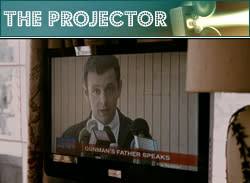Review: ‘Beautiful Boy’

1. Author Dave Cullen, in his terrific book "Columbine," contrasts not only the two high school shooters themselves (Eric Harris was a classic sociopath, while Dylan Klebold was more of a depressive), but also the shooter's parents. Dylan's parents, a couple of pseudo-aging hippies who loved baseball and suburban life, certainly did not grieve in public, but they made their regret and anguish more well-known, at one point even writing an essay in Oprah's magazine about the experience; Eric's remain fiercely private, never giving an interview or sending out any public statement. (This, perhaps inevitably, has only made them seem more suspicious.) In many ways, the story of the parents is a far more fascinating one than the teenagers'; while the crimes themselves are unfathomable, having a sullen child who harbors dark secrets is something every parent understands, and fears. Raising a child is a test you never know you've failed until it's too late. What the parents of Eric and Dylan went through is an even bigger nightmare, in many ways, than even what the parents of their victims went through.
2. In "Beautiful Boy," Michael Sheen and Mario Bello play Bill and Kate, the parents of a boy who kills 20 people in a college campus shooting as open, festering wounds, two people who were damaged before the shooting and absolutely devastated afterward. They ask themselves whether they were to blame and what they could have done, and they attempt to navigate a world that believes them to be monsters, along with the son they grieve so painfully. This is a riveting concept for a film, particularly when you toss in, as "Beautiful Boy" does, that they were in the midst of a breakup when the tragedy happened, turning two people at odds into the only two people on earth each other can count on. And theoretically speaking, "Beautiful Boy" should work. But Sheen and Bello are up for digging deeper than the film they're in is.
3. "Beautiful Boy"'s heart is clearly in the right place, and it does a comprehensive job of attempting to chronicle everything this couple would have to face, from a supportive-but-wary extended family to the nonstop media coverage to the specter of having to face the parents of a child your child killed. In fact, I wonder if it's a little too comprehensive; after a while, the narrative sort of breaks down into an unrelenting series of scenes involving two people crying, first together, then separately, then together again. And for a film that's devoted to capturing the particulars of how a community and a family respond to such a tragedy, it's curiously slack and sometimes even cliched in how it portrays those particulars. It's one thing for Bill and Kate to fear that the world believes them to be terrible parents. It is quite another for Bill to turn on the television at the exact moment a caricature of a news talking head is telling the world that he's a horrible parent, and a murderer, and everything else that might maximize his pain at that specific second.
4. The film's explicit insistence on keeping its focus so much on the couple themselves ends up causing it to lose touch with the larger story; there are times in "Beautiful Boy," when the film is burrowing into the couple's marriage issues, when you wonder whether or not this even needed to be about the parents of a school shooting. It's almost too small for the subject at hand; it's almost as if a simple lost child would have sufficed, considering that the film is far more about them struggling with their pain rather than their guilt.) For its high-concept hook, "Beautiful Boy" is oddly skin-deep about the ramifications of such an event; Bill and Kate, who would be recognized around the world after the shooting, walk around unnoticed at the plot's whim, even at one point being in the same room as one of their son's victim's mother. In reality, the ensuing confrontation would be enough to write five films about; here, the movie is more concerned with how Kate's sister-in-law handles having Kate and Bill in their house to stop and give it to us. Perhaps it's just that it tackles such a weighty topic, but the film almost seems too breezy and facile to slow down, take a breath and deal with what's really happening. It turns a national tragedy into a relationship drama.
5. That the film's perspective is off-kilter and out of whack is no fault of the leads, both of whom are terrific. Sheen, who has started to show a bit of a dangerous, almost sexy streak in his post-Tony Blair period, doughs up to play a boring American suburban dad who is distant with his family but never realized he was being that distant. As always, though, Bello's the standout. She's been criminally underrated for years and is as fearless as ever as a mother who's stubborn and damaged and, ultimately, more resiliant than anyone could have believed, most of all herself. These parts are actors' dreams, and Bello and Sheen are both outstanding. But they're not a dream for writers who have to navigate this impossible terrain, and definitely not for writer-director Shawn Ku, who is earnest and sincere and capable and not at all up for the narrative minefield he lays out for himself here. You have to be perfect for a project as perilous as this one to work. "Beautiful Boy" is far from it.
Grade: C+

